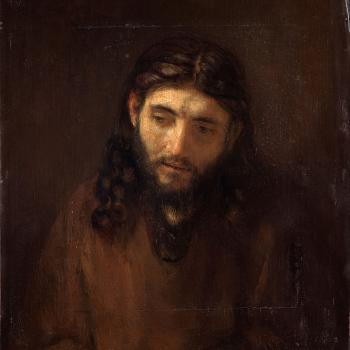
This is a discussion that took place on Scott Eric Alt’s Facebook page (public post). Henry Karlson’s words will be in blue, Sam Urfer’s in green; that of all others in brown. My words are in regular black.
*****
[Rebecca Bratten Weiss; henceforth “RBW”] I was attacked for referring to the HS as “she.” These folks are ignorant of tradition.
Of course they are.
[Laura Grantham Broussard: LGB] Are they really this stupid? I thought these people obsessed over Classical Education? Hagia Sophia.
Scott Hahn has done the same. I remember writing about it some years ago. Jesus referred to God (Himself) as a hen gathering her chicks. It can be done at least in a metaphorical way.
Hagia Sophia isn’t the Holy Spirit, actually, but the Logos, i.e., Jesus being referred to in feminine.
RBW: All three Persons can be referred to via both genders.
We don’t say, of course, of Jesus, that “she delivered the Sermon on the Mount” or “she raised Lazarus from the dead.” And that’s because Jesus was a man, when He took on flesh in the incarnation. Nor do we say, “Our Mother, who art in heaven” etc.
So in what sense can we refer to Jesus and God the Father with feminine gender? What would be some examples, and Bible passages? I’m unaware of any Bible translation that does this.
The hen and chicks example I gave is metaphorical indirect analogy, not really a direct personal reference. God the Father ain’t called “the mother hen” anywhere.
Hagia Sophia means “holy wisdom.” How is that Jesus being referred to in the feminine?
LGB: Are the -ia suffixes not indicative of the feminine gender? I don’t speak Greek.
Yes, but it’s referring to wisdom, which (like most such things, I think) is given a feminine linguistic sense.
LGB: Yes, but it’s a reference to the Wisdom of God, right?
“Wisdom of God” is a scriptural usage [including referring to Jesus in that way]:
[link to relevant Bible passages in RSV]
But in Proverbs and the Book of Wisdom it’s a use of personification, a particular literary and poetic genre.
LGB: I never knew if or that the concept was tied to any Person, but I have always been taught it refers specifically to God’s Wisdom.
This passage from Wisdom 7 is traditionally understood as referring to God the Logos:
“for wisdom, the fashioner of all things, taught me.
For in her there is a spirit that is intelligent, holy,
unique, manifold, subtle,
mobile, clear, unpolluted,
distinct, invulnerable, loving the good, keen,
irresistible, beneficent, humane,
steadfast, sure, free from anxiety,
all-powerful, overseeing all,
and penetrating through all spirits
that are intelligent and pure and most subtle.
For wisdom is more mobile than any motion;
because of her pureness she pervades and penetrates all things.
For she is a breath of the power of God,
and a pure emanation of the glory of the Almighty;
therefore nothing defiled gains entrance into her.
For she is a reflection of eternal light,
a spotless mirror of the working of God,
and an image of his goodness.
Though she is but one, she can do all things,
and while remaining in herself, she renews all things;
in every generation she passes into holy souls
and makes them friends of God, and prophets;
for God loves nothing so much as the man who lives with wisdom.
For she is more beautiful than the sun,
and excels every constellation of the stars.
Compared with the light she is found to be superior,
for it is succeeded by the night,
but against wisdom evil does not prevail.
Hagia Sophia is feminine in form. And Wisdom has children, as per Scripture. Plus, there is discussion of milk of Jesus in mystical literature (see Bynum, Jesus as Mother).
So, Wisdom is justified by her children (Luke 7:35) indicating Jesus himself — the Sophiological literature is seen as feminine in mystical theology. It’s legit.
LGB: Thanks, Henry. I’m not a theologian; I have a very murky sense of this stuff.
More than welcome; I always recommend Bynum’s Jesus as Mother, which is really one essay in the book with the name, because it shows the medieval engagement of Jesus in feminine form.
“The Gospel of John portrays Jesus in the language of wisdom in Proverbs: Jesus, like Wisdom, calls out to people to listen to him, promises to tell them the truth, seeks disciples, invites them to a banquet, and gives them life. Writers in the patristic period used the language of pre-existent wisdom to express the idea of the pre-existent Word with God.” [citation of USCCB source, “Proverbs, Chapter 8”]
[Sam Urfer then cited a long passage on Wisdom, without identifying the biblical source, so I will omit it]
That use [Wisdom 7] is personification.
That’s not referring to Jesus [i.e., not in every jot and tittle]. So, for example, Proverbs 8 is also about wisdom. Some folks want to believe it’s [totally] about Jesus. Jehovah’s Witnesses do so. And do you know why? Because if it is Jesus, it would mean He was created, as they believe (the Arian heresy), since 8:22 (RSV) states: “The LORD created me at the beginning of his work, the first of his acts of old.”
That’s rank heresy, since Jesus is eternal and uncreated (being God). Wisdom 7 is an example of the same thing (same sort of “wisdom literature). It can’t be [in every single passage] about either God the Father or God the Son because wisdom is described in contradistinction to God: “breath of the power of God” (7:25), “emanation of the glory of the Almighty” (7:25), “mirror of the working of God” (7:26), “image of his goodness” (7:26).
The same theme continues in the next chapter, showing that wisdom is not being equated with God: “She glorifies her noble birth by living with God, and the Lord of all loves her” (8:3), “I perceived that I would not possess wisdom unless God gave her to me” (8:21).
All use of gender is personification for the persons of the Trinity. Calling God “he” is personification. Please, don’t play games.
And yes, [the] Luke passage I quoted [7:35] is referenced to Jesus (indeed, the early patristic tradition save Irenaeus mostly looks at Jesus as Divine Wisdom); for Jesus is accused and he points to himself and his justification.
Dave, study up on the wisdom literature, and its use in Christological debates. Then you will see that people, following the use of Wisdom, can and will use it to reference Jesus in feminine — you asked where, it was shown where Jesus himself used it in reference to himself. That is enough to answer your question. I will leave it at that. If you want to know more, I have recommended an actual scholarly source. If you don’t and want to argue, not interested.
The Wisdom Literature (Copyright 1995, by William G. Most):
At the start it is good to notice a development in the
Old Testament thought about wisdom. In Job 28.12-27 and in
Baruch 3.9 – 4.4 Wisdom is a divine attribute by which God
creates and rules all things. Man cannot get it by his own
efforts, but God gave it to man in giving the law (cf.above on
Dt. 4.6-8). Another step of the development appears in
Proverbs 1.20-33; 8.1-21 and 9.1-6 in which Wisdom is
personified – for the Hebrew word for Wisdom hokmah is
grammatically feminine ( So is Greek sophia). Hence wisdom is
often spoken of as a woman, But this is only a
personification, following on the fact that the noun, as we
said is grammatically feminine. Grammatical gender has nothing
whatsoever to do with real sex. That has not prevented
utterly foolish people today from saying there is a separately
divine person, who is female. But as we said,this is a
personification, and it no more stands for a physical person
than does Lady Folly, also found in Proverbs 9.13-18, who
lures men to their death. But Lady Wisdom stands on the
corners and invites people to listen to her words and follow
them.In Proverbs 8.22-31 Wisdom is spoken of as if separate
from God – this is just a further development of the
personification. She came forth from the mouth of the Most
High (24.1), when God created her in the beginning and before
all ages (24. She went about heaven and earth and the nether
world looking for a resting place (24.4-7), but finally took
up her abode in Jerusalem (24.8-12), where she flourished and
produced much fruit(14.13-17), which she invites men to
partake of (24.18-21). Really this divine wisdom seems the
same as the Mosaic Law,which, as we saw above, is true wisdom.Finally the Book of Wisdom (7.22 – 8.1) pictures divine
wisdom as “an aura of the might of God and a pure effusion of
the glory of the Almighty (7.25), as an intelligent
spirit (7.22) who advised God at creation (8.4). Wisdom can do
all things ( 7.27) and knows all things (9.11– we think of
Aristotle’s ideal of wisdom), penetrates all things (7.24) and
governs all things (8.1). Wisdom is God’s beloved companion
(8.3) an attendant at His throne (9.4). . . .Actually the wisdom contained in the wisdom books is a
blend of human astuteness and divine wisdom.
Fr. William G. Most is a great scholar as well (doctorate in classics).
Yes, I know who he is, and I know the Sophiological tradition; you have yet to answer my point. You asked how and why someone could do so; I have shown so. Your response” it’s poetic” “its personification” ok, if you want to follow that route, then others can continue and call Jesus in feminine form through poetic diction, and so you have your answer. Of course, there is more complexity and depth in the theological tradition than simplistic dogmatic apologetics which argues through authority when ignorant — if I wanted to do that, I would just load you up with the works of Solovyov, Bulgakov, Florensky, and so many others – and say “they are great theologians.” Which they are — and far superior when dealing with the Sophiological tradition (not limiting it, like you do, with one form of Biblical theology which you normally would contend against if people pushed it literally against the fullness of tradition and suggest, for example, hell is not real because it was merely a garbage dump). Not interested. I gave resources.
There is a sense in which Jesus Himself is “wisdom” too. But whether that makes Him “feminine” is a separate question. Rebecca said, “All three Persons can be referred to via both genders.” No one has uttered one peep proving that. Sam Urfer cited Wisdom 7. I simply noted that this was personification and can’t be interpreted [completely] literally.
Scott Hahn (also a scholar, since that seems to be some sort of requirement of all discussion for Henry), puts both aspects together in his comments on Matthew 11:19 and 11:28-30 in his Ignatius Catholic Study Bible. 11:19 reads at the end: “Yet wisdom is justified by her deeds.” Scott Hahn writes: “Recalls OT traditions that personify wisdom (Prov 8-9; Wis 7:22-8:21; Sir 51:13-30). Jesus transfers these to himself . . . . Paul similarly regards Jesus as ‘our wisdom’ (1 Cor 1:30).”
For 11:28-30 he writes: “These parallels reinforce Jesus’ self-identification as ‘wisdom’ in 11:19.”
Also, the use of masculine pronouns for God is not merely personification. That’s an entirely separate question. See: “Why God is Father and Not Mother” by Mark Brumley. He cites Pope Benedict:
Cardinal Ratzinger made a similar point in The Ratzinger Report: “Christianity is not a philosophical speculation; it is not a construction of our mind. Christianity is not ‘our’ work; it is a Revelation; it is a message that has been consigned to us, and we have no right to reconstruct it as we like or choose. Consequently, we are not authorized to change the Our Father into an Our Mother: the symbolism employed by Jesus is irreversible; it is based on the same Man-God relationship he came to reveal to us.”
You just ignore what you ignore and leave it at that. To summarize. We have already established Jesus is the Wisdom of God and the Wisdom of God is feminine in form, and is referenced in feminine form talking about things women do. There are other allusions to feminine aspects of Jesus which are also picked up by medieval theologians — which is why I recommended a book on the very topic. But Wisdom (Jesus referencing himself) is justified in “her children” shows Jesus uses feminine for himself through adaptation of Sophia to himself, which is one of the many reasons why the question of the Wisdom of God was raised in ancient Christology. To say no one has offered what has been offered because you just click and paste links which do not address what was stated to you is indicative that you do not want to engage and learn why people use feminine form for Jesus — in tradition. I will leave you in your “hear no answer” closed-in on links as you wish. The answer has been given. More could be given if I wanted to play a game of links. I don’t. I just wanted to give a simple answer which one who knows theology would be able to figure out; those who just defend preconceived conclusions will always end with their confirmation bias.
LGB: Was it Elizabeth of the Trinity who famously called God “Mother” in a specific context?
She might be one. Julian, of course, is famous for it. [cites a Vatican page about her saying “God is our Mother”]
We’re basically talking about two different things. I stated, before this sub-discussion, how Jesus applied a feminine metaphor to Himself (hen and chicks). I also mentioned how Scott Hahn used feminine metaphors for the Holy Spirit. I defended him doing that many years ago [October 2009]. Those things exist.
That’s quite different, however, from claiming that we can now use the language of “God the Mother” and suchlike. No Bible does that, and Bibles are translated by scholars, who know language (and theology).
I was simply noting that Wisdom 7 is personification (which Scott Hahn and William Most also believe). That can’t be taken totally literally. But the Bible also refers to Jesus as the “wisdom of God.”
I acknowledged that, too, in the link I gave to Laura above. If you follow the link it shows just that: that Jesus is called “Wisdom of God.” So we don’t disagree on that, though you seem to think we do. If you’d cease your hostility towards me, perhaps you’d actually understand what I am arguing. Instead, you spout off with your “scholars only” nonsense, as if no non-scholar can even discuss theology. That would be big news to G. K. Chesterton, who had no theological degree: in fact no university degree at all.
When did you become sola scriptura?
Enough is enough — you even have a Vatican link which calls God as our Mother. Enough is enough.
When did you become a pompous, condescending ass? I just agreed with a major portion of your argument (in fact, I never disagreed with it), yet you still aren’t aware of it.
I have given sources which you constantly ignored, and sad “well we can’t do X” which those sources did, and then you call me that? Thanks.
I made links to scholars precisely because you have run down, again and again, any discourse about this from non-scholars. Very well, then. I cited scholars Fr. William Most and Scott Hahn.
Then I catch hell for citing links. That’s cute. So I have zero authority, being a mere lay apologist, but I can’t cite those who do have authority (scholars)! What, then, would you have me do? Just bow to your wisdom and accept that this book by Bynum is magisterial and infallible?
You’re the one playing “hear no answer” games here, not me. I’ve interacted with every major point brought up. I showed how I totally agree with one of your main points. I can’t do everything at once. You wrote: “I have recommended an actual scholarly source. If you don’t and want to argue, not interested.”
So you predicted your own behavior. I’m supposed to shut up and go read your source. If I keep talking, there is something wrong with me, and you have no interest in that. Great. I’m not supposed to say anything, because I am merely an apologist blowhard with no credentials (so you seem to think). Go soak yourself in your own ego, then, and get away from trying to talk to me. No skin off my back.
The Julian of Norwich citation is very interesting. Mystical literature can be quite wide-ranging and metaphorical, of course. I edited a whole book of it, including Julian (it was a wonderfully educational experience).
Even this excerpt, however, shows that she continued to use masculine pronouns for God, even in introducing the feminine. For example:
“Jesus Christ therefore, . . . is our true Mother. We received our ‘Being’ from Him and this is where His Maternity starts.”
“And He showed me this truth in all things, but especially in those sweet words when He says: . . .”
“. . . through his marvellous and deep charity . . . He wanted the Second Person to become our Mother, our Brother, our Saviour. ”
“. . . to thank him reverently and to praise him for having created us . . .”
“. . . His love never lessened and never will. In this love he accomplished all his works, and in this love he oriented all things to our good . . .”
“. . . the love with which he created us . . .”
I was asking Rebecca specifically about use of personal feminine pronouns for God. These I don’t find in Scripture. And even Julian of Norwich doesn’t do it (at least not in the excerpt provided).
I interpret that as her meaning it in the sense of metaphorical comparison, such as what I endorsed and mentioned above: Jesus saying He wanted to gather Jerusalem like a mother hen and her chicks, and other similar examples.
Brian Gronberg: Henry, this is why the apophatic tradition resonates so deeply with me.
Right, quite important. And alas, I don’t think some people follow through with what was said about that.
Deum humanam sexuum transcendere distinctionem. Ille nec vir est nec femina, Ille est Deus. [“God transcends sexual distinctions. He is neither man nor woman: he is God!”]
CCC 370 In no way is God in man’s image. He is neither man nor woman. God is pure spirit in which there is no place for the difference between the sexes. But the respective “perfections” of man and woman reflect something of the infinite perfection of God: those of a mother and those of a father and husband.
Isaiah 49:14-15 (RSV) But Zion said, “The LORD has forsaken me, my Lord has forgotten me.” [15] “Can a woman forget her sucking child, that she should have no compassion on the son of her womb? Even these may forget, yet I will not forget you.
Isaiah 66:13 As one whom his mother comforts, so I will comfort you; you shall be comforted in Jerusalem.
Psalm 131:2-3 But I have calmed and quieted my soul, like a child quieted at its mother’s breast; like a child that is quieted is my soul. [3] O Israel, hope in the LORD from this time forth and for evermore.
Granted, the Bible occasionally uses feminine similes for God. Isaiah 42:14, for example, says that God will “cry out like a woman in travail.” Yet the Bible does not say that God is a woman in travail, it merely likens His cry to that of a woman.The fact is, whenever the Bible uses feminine language for God, it never applies it to Him in the same way masculine language is used of Him. Thus, the primary image of God in Scripture remains masculine, even when feminine similes are used: God is never called “She” or “Her.” As Protestant theologian John W. Miller puts it in Biblical Faith and Fathering: “Not once in the Bible is God addressed as mother, said to be mother, or referred to with feminine pronouns. On the contrary, gender usage throughout clearly specifies that the root metaphor is masculine-father.”
In fact, the Bible ascribes feminine characteristics to God in exactly the same way it sometimes ascribes such traits to human males. For example, in Numbers 11:12 Moses asks, “Have I given birth to this people?” . . . Obviously, Moses uses here a maternal metaphor for himself; he is not making a statement about his “gender identity.” Likewise, in the New Testament, both Jesus (Matthew 23:37 and Luke 13:34) and Paul (Galatians 4:19) likened themselves to mothers, though they are men. Why, then, should we think that on those relatively rare occasions when the Bible uses feminine metaphors for God anything more is at work there than with Moses, Jesus and Paul?
You continue to say you agree then disagree at the same time, and you basically demonstrate you do not get what it means to say God is neither male nor female if you say we must make preference to the male. Not only has Scripture and tradition both shown what you contended: God is called Mother, God is given feminine references, you admit you know this all along after denying it then try to undermine it by saying “that’s metaphor,” which is true, but you then won’t do what is necessary about the masculine images and therefore fall into the same error as those who assume God has a body since it talks about God’s finger. Male and female both can be and are applied to God, both are analogies, but God is neither. That is all. To say “but I see masculine use, and therefore it is more appropriate even if I can find feminine use because all that feminine is poetic and metaphoric” fails to follow through with proper theological hermeneutics and just is a sleight of hand. You give preference to masculine, nothing else. That’s clear. Sexism. Clear. Enough.You keep ignoring basic theological concerns for your masculine supremacy. Not interested.
Ah, the inevitable! Now I am a sexist. Perhaps that explains your anal-retentive hostility from the beginning. And on that humorous and idiotic note (also in the midst of the irony that you are again arguing with me when you made it clear that you had no “interest” in doing so: as you say again now), I am delighted to end this farce of a discussion.
You are just pushing male for God, and saying it is something more right, which then does undermine women, for they are then less like God. But Scripture said male and female together are in the image of God. Both are equally analogous. It is sexism which is what you are promoting when you undermine feminine analogies for God without doing equal apophaticism with masculine. That means women are less like God than men, and that is false and that is indeed the sexism.
Sexism, racism, and the like often are unconscious filters, but it is still there even if the person thinks they are not following such evils.
Oh, please say I’m a racist, too. That would be even more fun.
Learn to interpret what others say better. I said sexism and racism are both unconscious filters; I did not say you were racist, but was giving an example of another such filter people often have but do not recognize. Please, your problem is you do not listen, you do not engage, you have a very narrow understanding without theological training, and that is noticed with your lack of nuance.
You definitely said I was sexist. I want racism, too! That’s the only fitting ending for such a ludicrous “discussion.” Not to mention humorous relief . . .
And now we again have the pompous “academic” condescension you exhibited above (“a very narrow understanding without theological training” / “lack of nuance”). Textbook . . .
I said there is a latent sexism in your response because you undermine the feminine while promote the masculine as superior in relation to analogies of God. That indeed makes women less than men, and that is not correct. Both are equally valid analogies for God. Both are analogies, not literal. The use of the masculine was a social convention for the time and place, as is well known even by the ancients when they pointed out the apophatic approach to Scripture and predications given to God. Enough is enough. I pointed out the problem with your position, own it or not.
So, let’s see: I’m stupid, pretentious, sexist, don’t listen, don’t engage, lack nuance, have woefully inadequate theological training, and am given to “simplistic dogmatic apologetics which argues through authority when ignorant” (with my ten published books from five reputable publishers, three Imprimaturs, Foreword to my first book and enthusiastic endorsement from Servant of God Fr. John A. Hardon, S. J. [adviser to Blessed Pope Paul VI and catechist for St. Teresa of Calcutta] — who stated 25 years ago that my writing was “very Catholic” –, published articles all over the place [not talking about Patheos: actual Catholic magazines], over 20 radio interviews on nationally or internationally syndicated shows, etc.). Man, how I fooled all those people who didn’t realize how dumb and unqualified I was!
[I found something] “Henry Karlson is a doctoral candidate in Historical and Systematic Theology at the Catholic University of America. He has taught at Georgetown and Catholic University, and is a contributor at Vox Nova.” [link]
Excellent! I commend you. We ought to get along great. But that’s why you’re looking down your nose at me, huh? because I’m just a lowly lay apologist?
*****
Photo credit: [Max Pixel / CC0 public domain license]
***













